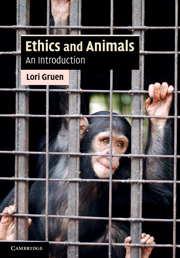7 - Animal protection
Published online by Cambridge University Press: 05 June 2012
Summary
Animal activists are known for going to outrageous lengths to get their messages heard. It would not be odd to see protesters dressed as rabbits outside companies that test their products on animals, or wearing nothing but lettuce leaves outside steakhouses. Some activists put themselves in cages in the parking lots of fast food joints, chain themselves to coffins to protest military experiments, or cover themselves in bloodied plastic wrap outside butcher shops. They have been known to stage mass die-ins in front of the meat section at grocery stores, throw fake blood at people wearing fur, and harangue circus goers as they enter or leave the big top. They use bullhorns; they chant; and they march. Well-funded activists run full-page ads in newspapers, put up billboards, or air television commercials. Sometimes they commit civil disobedience by participating in sit-ins or blocking entrances at sites where practices they reject occur, and they are carried off, limp bodied, to jail. Sometimes activists go further, breaking into laboratories or fur farms to liberate animals, destroy equipment, and otherwise cause economic damage.
As illegal direct actions involving costly property damage increased in the 1980s and 1990s, organizations that promote animal experimentation, agribusiness, the fur industry, and other “animal enterprises” pressured the US Congress to enact a law making it easier to prosecute those engaged in more extreme forms of protest.
- Type
- Chapter
- Information
- Ethics and AnimalsAn Introduction, pp. 188 - 206Publisher: Cambridge University PressPrint publication year: 2011



